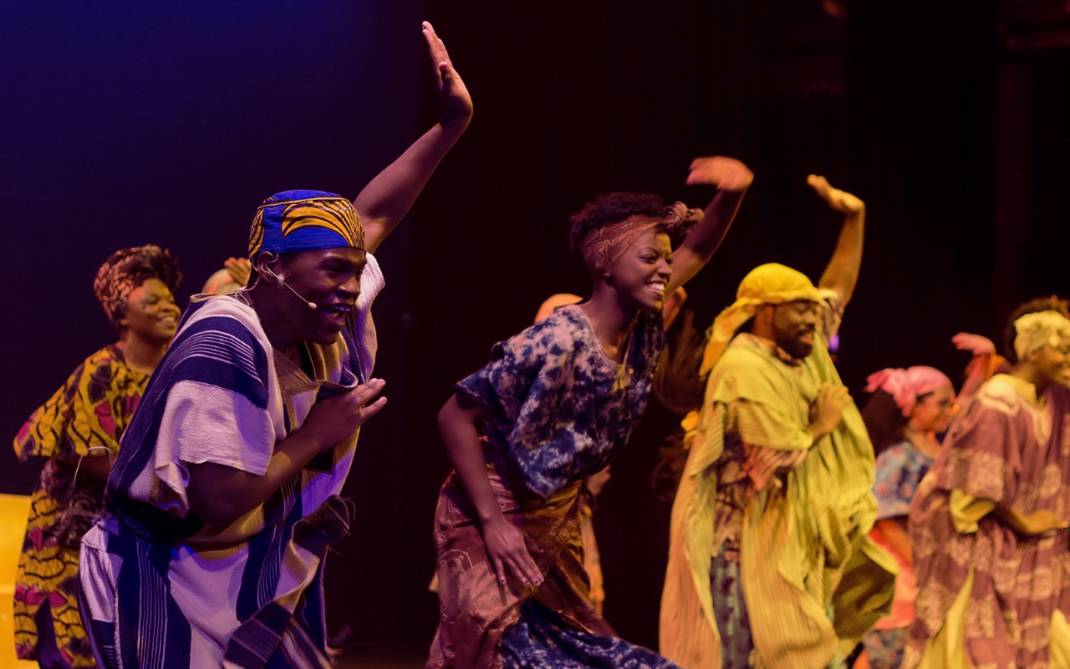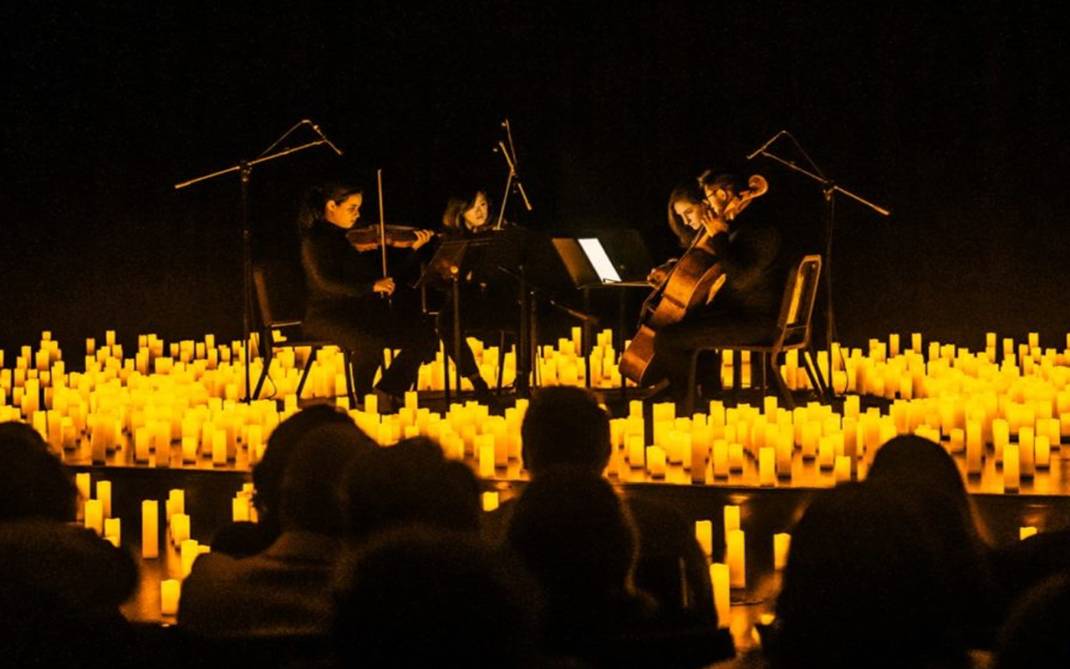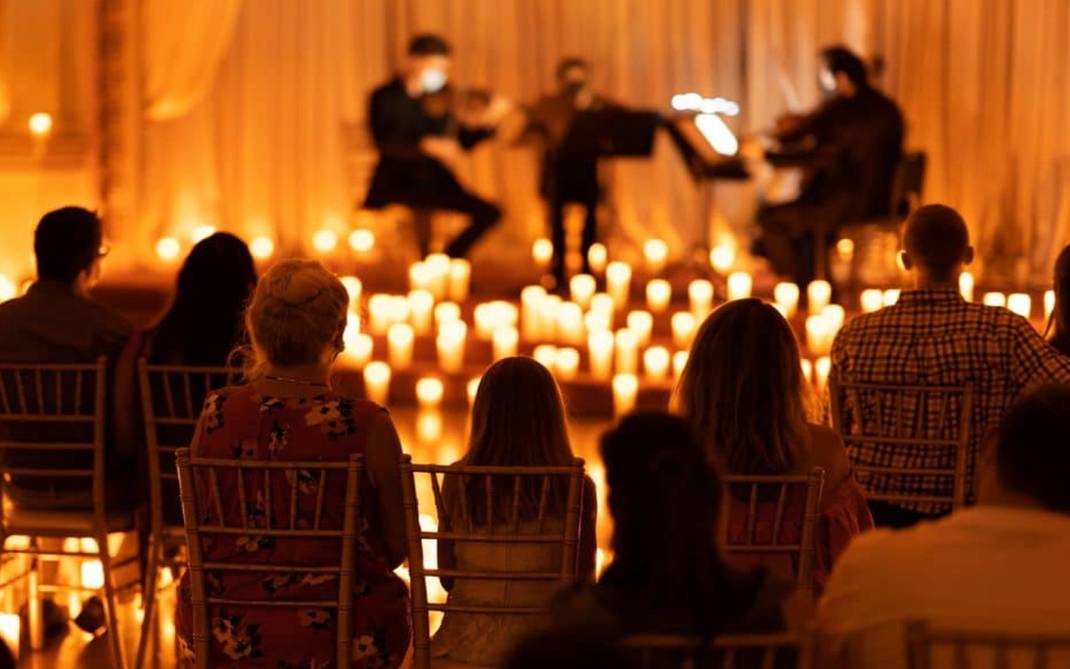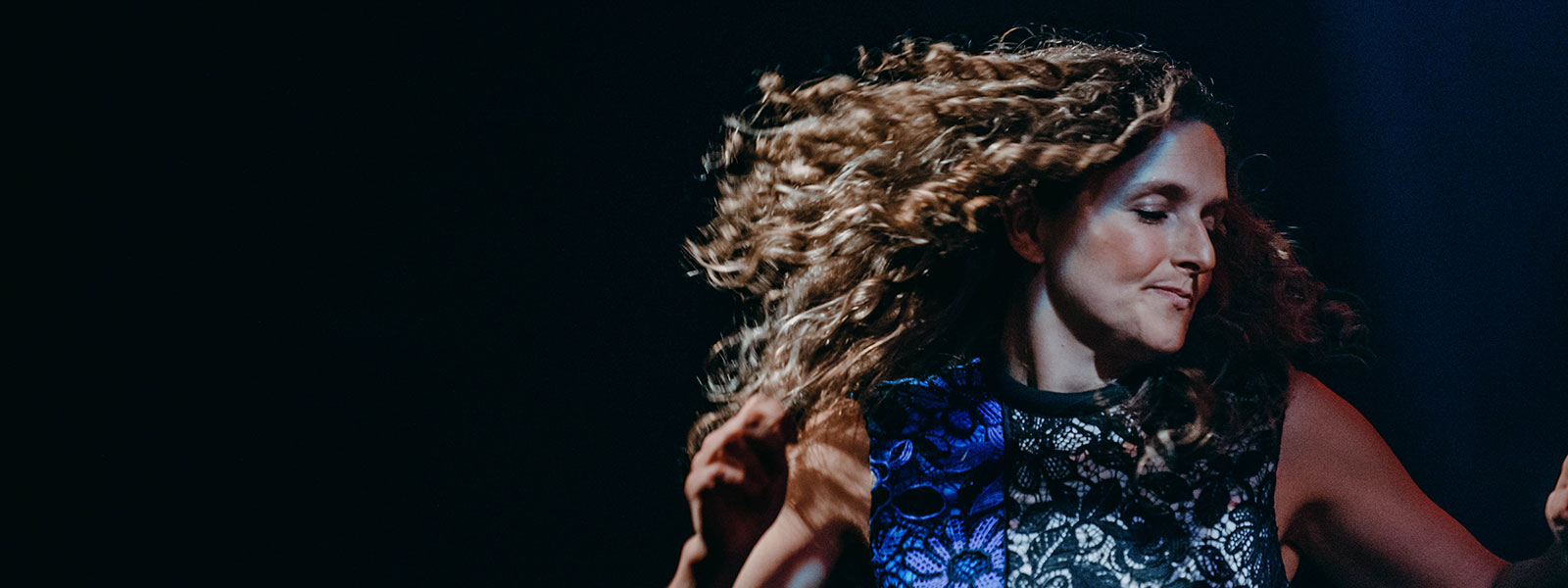Artist As Leader: Abigail Washburn
Abigail Washburn is not only one of the country’s premier clawhammer banjo players and folk-music composers, having won a 2016 Grammy for her duo album with her husband, Béla Fleck, and, until COVID-19 hit, having negotiated a busy international touring schedule. She is also an avid cross-cultural communicator and listener who believes in the spiritual power of music to bridge divides.
Long an admirer of Chinese arts and culture, she has in recent years collaborated and performed with classically trained composer and Chinese guzheng virtuoso Wu Fei. Together they delight audiences in the States and in China with the often remarkably similar sounds of Appalachian and Chinese folk music and the magic that occurs when both women find inventive ways to meld both instruments and traditions. In April of 2020, they released their first album, simply titled “Wu Fei & Abigail Washburn,” on the Smithsonian Folkways label.
Abigail spoke with Rob Kramer from her home in Nashville after a long day of intense distance learning. Eager to continually improve her command of Mandarin Chinese, she is currently enrolled in an advanced language program at Middlebury College, where she first started learning the language as a teenager during summer intensives.
Choose a question below to begin exploring the interview:
- Do you consider yourself a leader?
- How do you collaborate? How do you engage someone or engage a group? How does that process work for you?
- You’ve collaborated for years now with Wu Fei, who’s from China. Does this notion of collaboration that you’re describing transcend culture?
- People may not know that earlier in your life you had thought about law school and maybe practicing law in China. My question for you is — and this is a little bit tongue-in-cheek, Abigail — are you practicing law or doing international relations secretly as an artist?
- What do you think needs to change then to encourage young artists and creative people to lead?
- Do you think that’s innate for artists, to be process-driven and generative?
- How do you go about selecting the people you want to collaborate with?
- What advice do you wish you had received as you were just starting out as an artist leader?
- Epilogue
Rob Kramer: Abigail, do you consider yourself a leader?
Abigail Washburn: [Long pause.] Wow, that should be easy to answer, shouldn’t it? The reason it feels not very easy to answer is because I’m not sure what the term leader is supposed to mean. I’ve gotten a lot of different mixed messages throughout my life about what leadership should look like. Depending on who I’m talking to, I would present the possibility of me being a leader in really different ways. Like, when I was a kid, we’d have these classes in public school on leadership. It would mean you stand out amongst your peers and somehow you wield power and you have charisma and you pull people together and can command their attention and sort of make them do things.
But as I’ve gotten older and as times have changed, I’ve started to believe that leadership not only is something very different but needs to be something very different. Rather than being about wielding power to compel people to act a certain way, I would say that it really needs to be about facilitating listening to one another.
If I can be a facilitator for people hearing each other or hearing themselves in a new way or activating their empathy, then I feel like I’ve taken a leadership role.
If I can be a facilitator for people hearing each other or hearing themselves in a new way or activating their empathy, then I feel like I’ve taken a leadership role. I don’t think it’s only unique, special human beings who can do that, and they don’t have to be particularly charismatic or particularly compelling in order to have that kind of leadership role in any group or in society or in family or wherever it may be. Or within themselves as a complex being, trying to understand all the different pieces that make us who we are.
Rob: When did you realize that you had some of these qualities of listening, of empathy, of drawing those connections between people?
Abigail: Well, when I was young, I definitely struggled with feeling too connected to other people’s emotional experience. I don’t know if that makes me unique from other people — I’m not sure — but I had trouble managing it, so I would often end up carrying around hardships that I saw others managing in their lives. It’s like my heart knows things about people. I think most people’s hearts know things about people, but for some reason, I came into the world without much armor or protection against it. And so my whole life’s work in my emotional being has been to try to figure out how to compartmentalize and how to manage how I feel other people’s experience of the world. And to figure out what the difference is between their experience and mine and cultivate a sense of myself. That’s just my life’s work because of the way I came into the world.
Rob: So how do you collaborate? How do you engage someone or engage a group? How does that process work for you?
Abigail: Collaboration for me has everything to do with who I’m in the room with and what is our purpose together. Take, for example, working with my husband, collaborating with my husband, making music. We generally know what our goal is. It’s either some kind of show that we’re going to put on. We’ve been doing these “Banjo House Lockdown shows” every Friday … well, every Friday and then it became every other Friday, and now I’m not doing them.
He and I would prepare for these shows or for an album that we wanted to create. We knew when we were sitting down that we wanted to create material together that represented us not only as individuals but also as something new that we could never create alone, that could only be created because of the union of our perspectives, our thoughts, our musical experiences. So when we sit down, we immediately try to bring some ideas to the table. So there’s a little bit of prep work I’ll put into it. I’ll prepare some musical ideas that I think will inspire both of us to find some common ground musically and even activate his writing, his potential to add lyrics, for example, or to add some kind of melody.
I think about collaboration being a lot of different things. With my husband writing music for an album, it’s a very specific outcome we’re going for. I’ve also gotten to collaborate with, for example, a group called Pilobolus, which is a dance troupe up in Connecticut.
When they sit down, they like to sit down in the room and have nothing, start with nothing. Maybe they’ll throw out some games to try to play to help us create some movement that matches music or play with lack of sound, play with some sound. It really could go anywhere. The whole idea is that we just have these strong beings in a room together who are totally willing to listen and yet totally willing to contribute.
Then there’s these highly planned-out collaborations, where it’s like, “Hey, you know what? Let’s meet up to write a song for this specific event on this specific day. It’s got to be about women’s rights, and it’s got to be two minutes long, and it’s got to have a great chorus, and it’s got to have a bridge.” You sit down with someone, the two of us know exactly what we have to achieve, and we only have two hours to do it.
There are so many different kinds of contexts for collaboration that really shape what that collaboration becomes.
There are so many different kinds of contexts for collaboration that really shape what that collaboration becomes. I really love stepping into different kinds of collaborations with different parameters because it can lead to such different things. Not only that, but it teaches me so much about myself in different situations. Like, when I first sat down with Pilobolus to work, I had no idea I could improvise. I don’t have all these jazz chops, but I have this willingness and a playfulness to play with what I do have. That was a really neat discovery about myself, that improvising isn’t necessarily jazz chops over a certain harmonic progression. It can be just being willing to be playful in a situation where you have a couple of great artists that just want to put something together.
Rob: You’ve collaborated for years now with Wu Fei, who’s from China. Does this notion of collaboration that you’re describing transcend culture?
Abigail: I think this kind of collaboration that I’m talking about is a universal concept. However, we definitely need to bring our intelligence that we cultivate about different aspects of humanity and culture and language to anything we do. I do think it’s not just creating space by stepping away, but it’s creating space by actively asking other people to fill it in and to change your belief system. Like with Wu Fei, she’s had a huge impact on me as a person. It’s not like the first time I ever met her was in a studio trying to create music so that we could put out this bilingual, bicultural record. We’ve known each other for, oh gosh, almost 15 years now. We’re very close friends; we’ve been through a lot of ups and downs. We call each other sister for everything that it encompasses.
A lot of our work together has been listening and then also saying what we think needs to happen. But also we come to it with a spirit of, “Teach me. I want to learn. What is it that you know about American Appalachian music? What is it that you know about famous northern Chinese music?” Or, “Do you know that story from that opera from Anhui?” Or, “Can you tell me more about what the banjo styles would have been like in the hollers during the Civil War versus in the early 1900s?”
We just both are such nerds about wanting to learn what the other person has to teach us. That’s really how our collaboration came together, by this shared curiosity but also this shared bank of knowledge … or no, these separate banks of knowledge that had enough shared within them that we could really understand one another and learn from one another.
Rob: People may not know that earlier in your life you had thought about law school and maybe practicing law in China. My question for you is — and this is a little bit tongue-in-cheek, Abigail — are you practicing law or doing international relations secretly as an artist?
Abigail: [She laughs.] I do not work for the Central Intelligence Agency. Officially, I will say that. Nor the National Security Administration. I was approached, but I knew it was not the lifestyle for me.
I guess what I could say is, in the creation of my music I do have a hope that the collaborative spirit of it as well as the cross-cultural spirit of it does have an impact on the listeners, the people that care about the music. Maybe they find a home in it that feels familiar, or maybe they discover something they never knew. Whatever it is, I just feel really grateful that I get to share this music. I have this hope that it will impact people, whether it feels like a comfortable home or it feels like something that pushes them, challenges them to see music or see collaboration in a different way.
Rob: What was it about hearing Doc Watson and picking up the banjo that just drew you so far away from law to the arts and music?
Abigail: After my freshman year of college, I went to China for the first time. The long and short of it is that I fell madly in love with Chinese culture and realized that it was going to be an amazing lifelong challenge to try to study the language and engage with the culture and with the country. Indeed, it has been. I’m 25 years in, and it has been quite the roller coaster ride. A nonstop adventure. I really committed myself to the idea of doing some kind of bridging work.
At that time, I did not consider myself a particularly special musician. I sang a little bit, but that was it. It wasn’t till my senior year of college that I heard Doc Watson on a record and I went out and bought a banjo. So for me, Chinese came first, and this love of China and this idea of bridging cultures came first. I just thought that I would best do that in some kind of capacity that had to do with law. So that’s where I was headed, to law school in China, when I bought a banjo. I went to West Virginia and Kentucky and North Carolina that summer before I was going to leave for law school in China. And it led to a whole new life. I walked down that path, and I never went back to China to study law.
I quickly realized that music has this incredible ability to connect people’s hearts and minds. It doesn’t require intellect or rationale or logic to do it; it just has a spirit to it that moves people.
But I quickly realized that music has this incredible ability to connect people’s hearts and minds. It doesn’t require intellect or rationale or logic to do it; it just has a spirit to it that moves people. And being moved is just a basic part of being human. The idea that the music that I make can somehow connect people on opposite sides of the Earth and penetrate and break through the politics and the propaganda we hear on our opposite sides just means a lot to me. That’s a hope I hang on to.
Rob: What do you think needs to change then to encourage young artists and creative people to lead?
Abigail: Gosh, if I had a magic wand, I would change the notion of leadership in everyone’s minds to become one of collaboration and exploring what that means.
Right now I’m a part of an exploration of collaboration at UNC Chapel Hill. Luckily I get to partner and work closely with an amazing community member, the poet laureate of Chapel Hill. His name’s CJ Suitt. Together we’ve been facilitating a diverse group of six students and teachers on campus. We basically have gotten together over the last year and decided, totally collaboratively using a lot of the collaboration games that CJ has brought to the table, to create the idea for some events that we would put on together. The important thing was these people in this room, who they are and what they bring to the table. It isn’t supposed to be about outcomes.
However, we did want to go into the world and do something. Unfortunately, COVID-19 changed the trajectory of that, but I’m hoping it’ll come back next year. What the group came up with — after following CJ’s beautiful ability to pull a roomful of people out into creating a collaborative reality — was that we wanted to work on creating some events around sharing otherwise marginalized or hidden voices.
We came up with four different events. I believe it’s going to happen next year, either online or in-person with social distancing. The whole concept of that was just simply to engage in collaboration and experiment with what collaboration means. I wish that everybody could have an experience like that, specifically to sit in a room with CJ and play collaboration games, honestly, because it really just points out that perhaps it’s the process of connecting that’s more important than the outcomes we believe we should be creating.
Rob: Do you think that’s innate for artists, to be process-driven and generative?
Abigail: No. I know so many different kinds of artists. I would not say it’s innate or it’s a unifying piece of what makes us artists. I know artists that are songwriters so that they can get a hit song. They really know the formula, and they sit down and that’s what they do. Yeah, they’re in the process, but they’re really thinking about, “How am I going to make some cash off this thing?” [She laughs.]
Rob: Right. “How am I going to pay the bills?”
Abigail: I can’t blame them, you know? Especially right now.
Rob: Right.
Abigail: I hope, gosh, I certainly hope that every artist sinks deep into their process and enjoys that creative fertile ground that we get to roll around in and explore. If you really want to go there and you can go there, you can feel ancient voices, you can feel the future of possibility, you can feel all these different things channeling through you. It’s a phenomenal feeling. But I’m not sure that’s really what every artist needs to do or wants to do or that it even helps their process for bringing something to fruition. So I don’t know. I don’t know. I’d rather listen to a bunch of artists talk about what it is that makes them feel generative.
Rob: How do you go about selecting the people you want to collaborate with?
Abigail: Who I end up collaborating with seems to have a … I guess a lot of it has to do with my spiritual underpinning in life. I use the word God. When I think of God, I think of all that is around me. I can’t possibly understand the embrace of the life spirit, and so I am often awed by what comes into my realm and full of this gratitude pretty much constantly, except maybe once a month for a couple of days when I’m getting ready to have my period.
[Both laugh.]
I just am constantly amazed by how this world works and how different energies come and go from my life. ... I think that’s a lot of where my collaborators come from, this letting go of past burdens and a new space being created to find new people who just take me to that next place of deeper understanding of the world and art.
I just am constantly amazed by how this world works and how different energies come and go from my life. I feel like when I break free from patterns that have burdened me in my past, then all of a sudden these new opportunities for teaching me about what I can learn once I’ve let go of certain things just flow into my life. I think that’s a lot of where my collaborators come from, this letting go of past burdens and a new space being created to find new people who just take me to that next place of deeper understanding of the world and art.
Sometimes it’s extremely challenging, and sometimes it’s playful, and sometimes it’s really to do something very specific like, “Hey, let’s write a song cycle together.” I really only want to create space in my world to collaborate with people who will take me to that next place. Or who do challenge me. Or who are willing to collaborate in a way that there’s a whole lot of listening and a whole lot of giving. If I don’t have a sense that that can happen in a pretty mutual way, I’m probably not likely to want to collaborate.
Rob: What advice do you wish you had received as you were just starting out as an artist leader?
Abigail: Who you are is enough already, but also pursue your passions wildly and listen deeply and strive to let go of the burdens that keep you from creating space to learn anew in your life.
Epilogue
The delightful spirit and playfulness of Abigail Washburn are beautiful reminders of life’s gifts when we remain open to discovery. Lessons we can take from our discussion with Abigail include:
- Leadership is collaboration. Collaboration happens by choice and includes deep, empathic listening and an openness to learning.
- Collaboration crosses cultures and mediums. Music taps into fundamental components of being human, influencing people’s thinking and spirit.
- Collaboration includes a learner’s mindset. It thrives on a shared willingness to be curious about and be influenced by one another as well as an openness to be changed by the other.
- Collaborations are variant. Some are structured and goal-focused, and some are loose and have unknown outcomes. Both can be effective methods of working together.
- Collaborations are generative. Letting go of the old and allowing space for the new is essential to growing as an artist and a leader.



